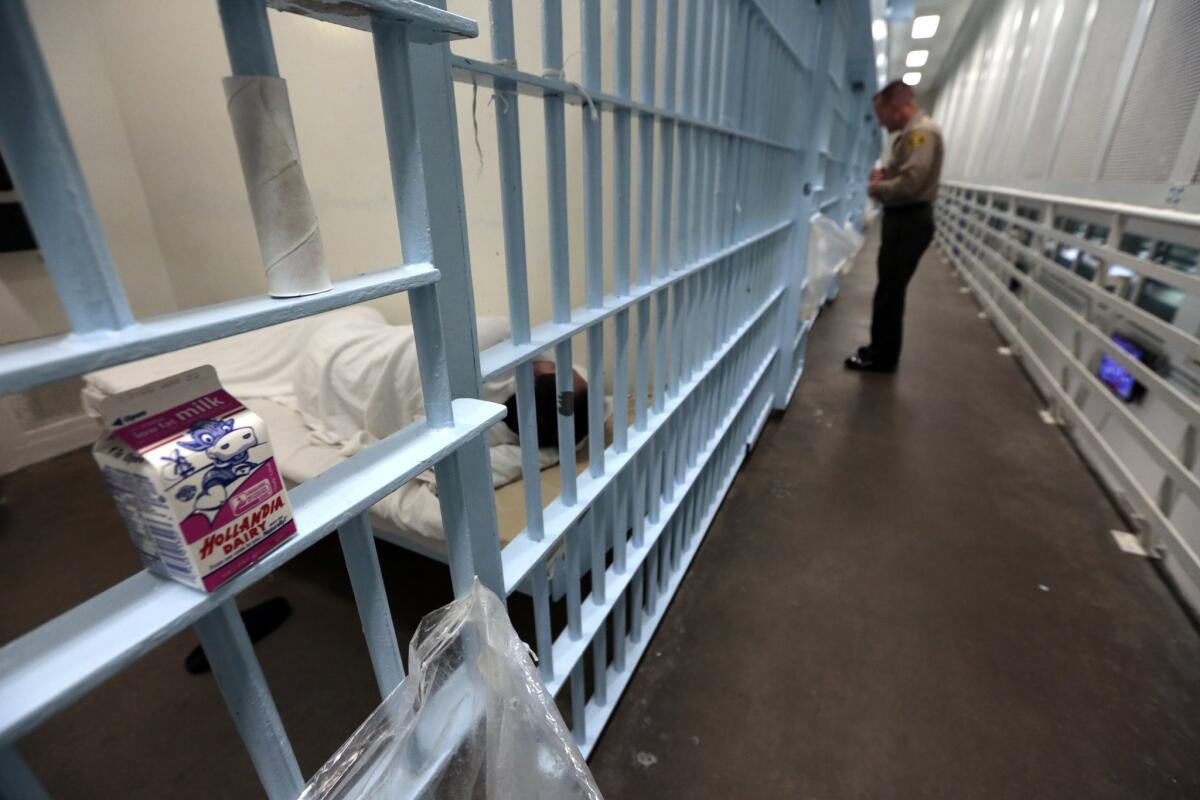L.A. County settles jail suicide case for $1.6 million

A sheriff’s deputy checks on an inmate in a renovated section of Men’s Central Jail.
The family of a 23-year-old man who committed suicide in Men’s Central Jail will receive $1.6 million from Los Angeles County to settle a lawsuit alleging that jail officials did not properly diagnose his mental illness.
Austin Losorelli, the son of an LAPD lieutenant, told jail mental health workers that he was hallucinating, had previously been hospitalized for psychotic behavior and had attempted suicide before. But he was not placed in mental health housing.
After his cellmates twice complained about his bizarre behavior, a jail deputy transferred him to a single-man cell, where he hung himself on Sept. 30, 2013.
The settlement comes a month after county officials signed a court-enforceable agreement with the federal government to overhaul the treatment of mentally ill jail inmates. Losorelli’s case was among those described in a June 2014 federal report that documented a sharp increase in L.A. County jail suicides, calling many of the deaths preventable.
“This was a perfect storm of deliberate indifference and malfeasance by the Department of Mental Health and the Sheriff’s Department,” said Ron Kaye, the Losorelli family’s attorney.
The family will donate much of the settlement money to help the mentally ill, Kaye said.
At age 11, Losorelli was featured in a Times article about a sheriff’s deputy shot to death by a crazed gunman in Stevenson Ranch. The boy set up a collection table at a busy intersection, raising over $8,000 for the slain deputy’s family.
“If my dad didn’t come home, it wouldn’t be good for me. It would be sad,” Losorelli said then.
By his early 20s, Losorelli was plagued by mental health problems, according the family’s lawsuit.
On July 24, 2013, he was jailed on charges of resisting an officer and public drunkenness. A judge sentenced him to a mental health and substance abuse treatment facility, but instead, he was released onto the street, the suit alleges.
His parents brought him home, calling every day to find out whether space had opened up at the treatment facility, according to the lawsuit.
Losorelli’s paranoid and irrational behavior continued, and his parents reached out to the sheriff’s detective who had originally arrested him, the lawsuit said. The detective recommended re-arresting him so he would be safe in jail.
Losorelli described his psychiatric history to jail mental health workers. He reported “auditory hallucinations of male and female voices which told him negative things” and mentioned that he had tried to kill himself with an overdose of pills in 2011, according to the lawsuit.
Still, he was placed in the general population of Men’s Central Jail. At another intake assessment, he told a psychiatrist that he was on antipsychotic medications, “sees bugs from time to time,” had stayed at psychiatric hospitals seven or eight times and had attempted suicide several times.
Losorelli’s cellmates quickly noticed that something was wrong. Losorelli made paranoid remarks that others were talking about him and that the television was talking to him.
“It’s not right. I don’t feel right,” he said while pacing and grabbing his head with both hands, according to the lawsuit.
The cellmates flagged down a jail deputy, who asked Losorelli whether he wanted to move somewhere else. Losorelli said he wanted to stay, and the deputy left him there, the lawsuit said. Losorelli’s strange behavior continued, and the cellmates contacted the same deputy again, who moved him to a single-man cell.
Later that same day, Losorelli ended his own life with a sheet looped around an air purifier.
“Out of respect for the family, we can’t talk about the details of the case,” Assistant Sheriff Terri McDonald, who manages the jails, said in a written statement. “However, we have made fundamental and substantial changes in regards to jail inmate suicides.”
As part of the agreement with the federal government, which will be overseen by an independent monitor and a federal judge, the Sheriff’s Department must reduce suicide hazards -- for example, by getting rid of ventilation grates or light fixtures where an inmate could attach a noose – and institute a series of other suicide prevention measures.
Suicides in L.A. county jails are down from 10 in 2013 to five last year and one so far this year.
On Tuesday, in addition to approving the Losorelli settlement, the Board of Supervisors reaffirmed an earlier decision to build a new 3,885-bed jail focused on mental health treatment and to fund a program that would divert at least 1,000 people from jail to treatment.
“Shouldn’t we be spending the money used to settle this type of case on getting people the help that they need?” Dist. Atty. Jackie Lacey said.
Times staff writer Abby Sewell contributed to this report.
Twitter: @cindychangLA
More to Read
Sign up for Essential California
The most important California stories and recommendations in your inbox every morning.
You may occasionally receive promotional content from the Los Angeles Times.











